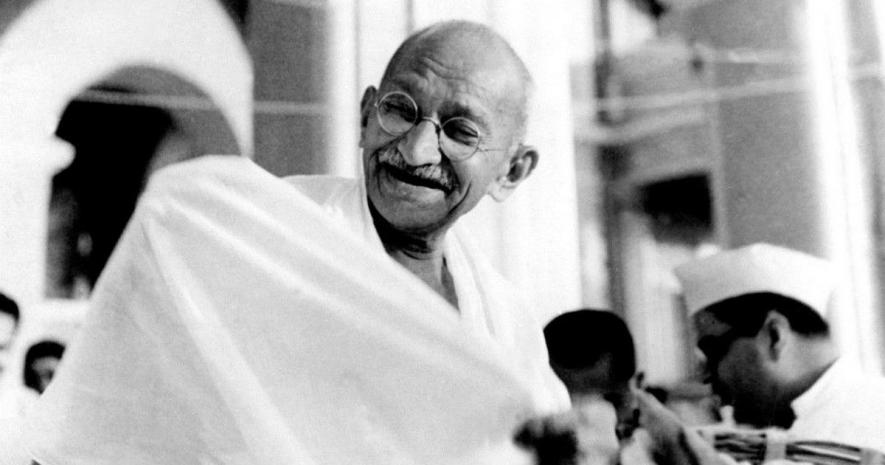Reaffirming Gandhi: Anti-imperialism, Political & Economic Democracy

Image Courtesy: Wikimedia Commons
On his 156th birth anniversary, Mohandas Karamchand Gandhi still stands as a reminder of the unfinished struggles against colonial domination, against the poison of communalism, and for a democracy that is not merely political but also economic. He was not just a political philosopher but a political leader who mobilised hundreds of millions to unite and resist colonialism. His assassination in 1948 at the hands of those who inspire the ruling neo-fascist dispensation demonstrated that the struggle Gandhi initiated is ongoing. It requires active and united resistance by the whole democratic movement.
Gandhi and the Anti-Colonial Struggle
Gandhi’s political genius lay in his ability to organise mass discontent with colonial rule into collective political action. From the Non-Cooperation Movement to the Civil Disobedience Movement and the Quit India struggle, he led peasants, workers, and Indians from all walks of life in offering a broad-based resistance to British colonial rule. The people of India constituted themselves into a modern state during these struggles. These struggles also spawned companion movements by workers, peasants and the socially oppressed.
Gandhi’s vision of political and economic democracy extended beyond the end of British colonial rule. His scepticism towards the capitalist system, regarding its generation of alienation, remains strikingly relevant today. Contemporary imperialism involves a calibrated deployment of military violence and economic coercion. This is achieved through the operations of US-oriented international finance capital and metropolitan multinational corporations. The current US administration, due to the threat to US imperialist hegemony, has abandoned even the pretence of negotiations to try and impose its interests unilaterally. The reaffirmation of political and economic democracy now is a demand for food sovereignty and authentic self-reliance. This derives from strategic autonomy and not from bartering away national interests to metropolitan capital. Such bartering is done merely to obtain the status of junior partners to metropolitan capital for the corporate cronies of the current neo-fascist dispensation. This unleashes the poverty, inequality and mass suffering that Gandhi would have keenly recognised and fought against.
Gandhi Against Communalism
If Gandhi had one unambiguous lesson for the India of today, it was his rejection of communal division. He warned that communal hatred, spawned by imperialism, would corrode the fragile bonds of a newly independent nation. His work in riot-torn neighbourhoods and his insistence on Hindu–Muslim unity were not symbolic acts but meaningful political interventions that laid the framework for India’s secularism.
His assassination by Nathuram Godse was not merely a personal tragedy but the political consequence of a communal ideology that despised secular democracy and served imperialist interests. This ideology currently seeks to establish a theocracy to further the interests of its corporate cronies. That communal design seeks to become and remain ascendant. Its method is deliberate: it involves erasing Gandhi’s pluralistic and inclusive vision of the freedom struggle, manufacturing Islamophobia, and peddling communalism as a substitute for economic justice while playing second fiddle to metropolitan capital. By othering minorities, the ruling neo-fascist dispensation seeks to mask its entanglement with metropolitan capital. This entanglement is at the heart of the setbacks that working people are confronting in the form of precarity, corporate encroachment into peasant agriculture, and the destruction of petty production. Gandhi’s warning remains valid: communalism remains the most corrosive weapon against national unity and inclusive development.
Drawing on Gandhi to Resist Neo-Fascism
The adversaries Gandhi fought against, namely imperialism and communalism, are now embodied in the neo-fascist dispensation. Neo-fascism combines xenophobia and majoritarianism to further the interests of the corporate financial oligarchy, and especially its corporate cronies, through the hollowing out of democratic institutions. Minorities are falsely pictured as foreigners, and majoritarianism seeks to keep the socially oppressed in a state of subordination, their agency only permitted to ‘other’ minorities. These machinations of neo-fascism in India are not aberrations, but a conscious political project designed to divide and therefore disempower working people.
Gandhi’s vision, like that of any other historical figure, is a work in progress, but it is unambiguous that he saw political and economic democracy as two sides of the same coin.
His inclusive concept of equality resonates today in a country where inequality has reached obscene levels reminiscent of the colonial period. Workers and peasants are systematically disenfranchised. Gandhi’s insistence that authentic freedom requires the fortification of the achievement of ‘one person, one vote’ with an economic and political system that encompasses collective dignity, sustainable livelihoods, and bread-based justice offers a lesson. This is a lesson that must be reaffirmed and built upon by the democratic movement today.
An authentic contemporary reaffirmation of Gandhi will not be possible if it involves iconising him by exclusively focusing on his selected words, deliberately used out of context.
The current neo-fascist dispensation pays lip service to Gandhi on selected occasions while its foot soldiers undermine his legacy and his relevance for contemporary India. This includes falsifying the role of the RSS in the anti-colonial struggle.
Reaffirming Gandhi today involves recentring his recognition of economic and political democracy as two sides of the same coin. This would today involve a determined fight on two fronts against neoliberalism: defending constitutional democracy while simultaneously rejecting the policy assault that enriches the corporate financial oligarchy to the exclusion of almost everybody else. It also lies in recognising that sovereignty remains incomplete as long as metropolitan capital dictates the economic future of India through the dominance of domestic politics by communalism.
On his 156th anniversary, Gandhi returns not as a relic of the past. Instead, the vision of Gandhi as reworked by the democratic movement can inspire the fight to resist the counter-revolution spawned by the neoliberal project against the achievements of the anti-colonial struggle. Gandhi’s work is also a reminder of how the unrealised potential of the anti-imperialist movement can be achieved.
The authentic reaffirmation of Gandhi is to resist neo-fascism and reclaim the Constitution and the republic, before those who once pulled the trigger on him succeed in pulling the trigger on India itself.
C. Saratchand is Professor, Department of Economics, Satyawati College, University of Delhi. Shirin Akhter is Associate Professor at Zakir Husain Delhi College, University of Delhi. The views are personal.
Get the latest reports & analysis with people's perspective on Protests, movements & deep analytical videos, discussions of the current affairs in your Telegram app. Subscribe to NewsClick's Telegram channel & get Real-Time updates on stories, as they get published on our website.























